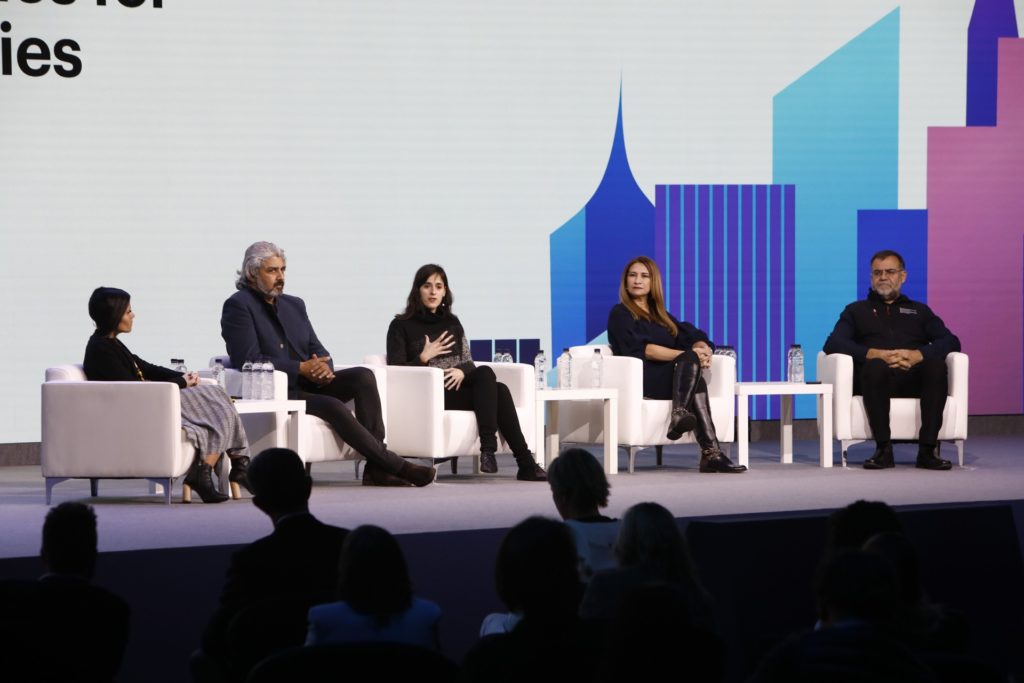
- The event organised by the Digital Future Society, promoted by Mobile World Capital Barcelona and the Secretary of State for Digitalisation and Artificial Intelligence took place on the Keynote Stage at MWC Barcelona.
- Nadia Calviño, First Vice-President and Minister for Economic Affairs and Digital Transformation, opened the event in a recorded message.
- The main keynote was given by Carme Artigas, Secretary of State for Digitalisation and Artificial Intelligence.

March 1, 2023
The Digital Future Society Summit at MWC Barcelona 2023 brought together national and international experts to discuss the steps to be taken to achieve a fair digital transition that prioritises respect for human rights, ethics and security, as well as the protection of privacy.
Francesc Fajula, CEO of Mobile World Capital Barcelona, kicked off the session by talking about the relationship between society and technology and how the latter is changing the way we communicate, socialise and consume. He also argued that the society we are moving towards must respect the values of a digital transition that leaves no one behind. The institutional inauguration was led by the First Vice-President and Minister for Economic Affairs and Digital Transformation, Nadia Calviño, who, through a recorded message, highlighted the need to put people at the centre of the digital transformation.
Carme Artigas, Secretary of State for Digitalisation and Artificial Intelligence, was the keynote speaker, highlighting Spain’s role as one of the countries leading the digital revolution. She also recalled that Spain has launched Spain Neurotech, one of the first five neurotechnology centres in Europe, the first focused on technological humanism. He then appealed to involve and take into account the new generations in the process, who, he pointed out, do not claim their digital rights because they are generally unaware that they have them. For all these reasons, he highlighted the value of initiatives aimed at raising digital awareness in society, such as the recently launched Generation D project (focused on digital skills) or the Digital Future Society itself.
Neurotech, the next frontier
The first panel, focused on neurotechnologies and their role in the new digital reality, was moderated by Elsa Punset, content director of the Laboratory for Social and Emotional Learning (LASE), and included the participation of Rafael Yuste, neurobiologist and professor of biological sciences at Columbia University and ideologist of the BRAIN Project; Álvaro Pascual-Leone, Professor of Neurology at Harvard Medical School; Ana Maiques, CEO of Neuroelectrics; José M. Carmena, Researcher and Professor of Electrical Engineering and Moderator of Neuroscience at UC Berkeley.
The round table began with the most basic question: what is neurotechnology? The speakers agreed that these are technologies that can change or improve the activity of our brains. The role of neurotechnology in improving brain function during ageing is a reality with a future perspective, for example applied to the treatment of mental illnesses or other pathologies such as cancer.
It was also discussed how some studies are already creating AI images in the brains of mice to see how they react to these stimuli. With this methodology, the aim is to see how to advance treatments for patients suffering from schizophrenia. There was also a focus on the importance of giving new impetus to technology as a tool for more effective monitoring of neurological diseases and designing treatments to slow or eliminate them.
All the speakers agreed on the need for a real transformation in the monitoring of this type of disease and for medical monitoring to be integrated into people’s lives through technology. Furthermore, they pointed out that the regulator is still not considering issues such as identity, autonomy and equality, which are fundamental questions to be considered and answered.
Ethical approaches to immersive realities
The second debate revolved around ethical approaches to immersive realities, focusing on respect for human rights, ethics and security as pillars for the construction of a Sustainable Global Digital Sphere.
The session was moderated by Esther Paniagua, Associate Director of the Center for Governance of Change; Ricardo Baeza-Yates, member of the AI Advisory Council of Spain; Poonacha Machaiah, CEO of the Chopra Foundation; Carissa Véliz, Associate Professor at the Institute for Ethics in AI, School of Philosophy, Institute for Ethics in AI at Hertford College; and Monica Taher, VP of Marketing at RocketFuel.
Speakers highlighted the ethical approaches needed for a safe immersive reality for all, including social relations in the digital space and the impact of new digital media, such as the metaverse. They discussed the role that immersive reality can play in combating today’s greatest pandemic, that of loneliness, but at the same time addressed the challenges that these same technologies pose to privacy.
Other topics discussed included the rise of cryptocurrencies and the need for governments to accept and integrate blockchain into the financial reality of society, something that could be of great benefit to the many people, mainly women, who currently live without bank accounts in developing countries.
Sustainable technology for good
The third and last panel, the confluence of the twin transitions. It was moderated by Pipo Serrano, journalist, with the participation of Jordi Serrano, Digital and Global Health Expert; Guillermo M. Gaunas-Vivas, CEO of Ayúdame3D; Chris Fabian, co-founder of Giga (UNICEF) and Lara Urban, IP at Helmholtz Pioneer Campus and Helmholtz AI. All of them presented some of the initiatives they are carrying out in this field, such as the design of an AI that makes it possible to relate the health of the planet with the impact it has on human health; the GIGA project of UNICEF and ITU to bring connectivity to all the world’s schools by 2030; or that of an association of entrepreneurs that promotes and promotes projects that seek to improve the environment.
ABOUT MOBILE WORLD CAPITAL BARCELONA
With public and private support, MWCapital focuses its activity on four areas: accelerating innovation through digital entrepreneurship; transforming industry through digital technology; growing digital talent among new generations and professionals; and reflecting on the impact of technology on our society.
We drive the development of the mobile and digital ecosystem to position Barcelona as a global digital hub. The city that hosts the Mobile World Congress (MWC) and 4 Years From Now (4YFN), the platform for start-ups present at MWC events around the world.
ABOUT DIGITAL FUTURE SOCIETY
Digital Future Society, an initiative promoted by the First Vice-Presidency – Ministry of Economic Affairs and Digital Transformation – of the Government of Spain, Red.es, and the Mobile World Capital Barcelona Foundation, which seeks to build a more inclusive, fair and sustainable future in the digital era. With this objective, it connects institutions, corporations, civic organisations and academia to generate debate, share knowledge, create solutions to the challenges presented by digital advancement and bring them closer to citizens. Digital Future Society works in four key areas: public innovation; digital trust and security; equitable growth; and citizen inclusion and empowerment.
Stay up to date about everything
Subscribe to stay up to date with the latest content from Mobile World Capital Barcelona.